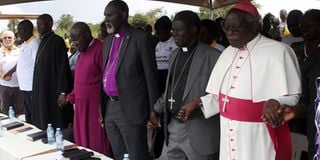Religious leaders pray for South Sudan refugees

Prayer. Gulu Archbishop John Baptist Odama (right), together with religious leaders from South Sudan led by Bishop Arkanjelo Lemi (3rd right) during the prayers at Palabek Ogili Refugee Settlement Centre, Block 2, Lamwo District, on Tuesday. PHOTO BY CISSY MAKUMBI
What you need to know:
Solidarity. The clerics say the prayers were held to show solidarity and togetherness with South Sudan refugees settled in the region and those back home.
Religious leaders in Acholi Sub-region under their umbrella Acholi Religious Leader’s Peace Initiative (ARLPI) and their South Sudan counterparts South Sudan Council of Churches (SSCC) have held a solidarity prayer for refugees in Lamwo District.
The prayers, under the theme “Way to resolution - John 8:48-59”, were held at Palabek Ogili Refugee Settlement Centre, Block 2 on Tuesday.
During the event, refugee children and women from South Sudan living in the three settlement centres of Palabek Ogili, Palabek-Gem and Palabek-Kal, all in Lamwo District, held placards inscribed with messages such as “Stop violence in South Sudan,” “Forgive one another,” “We want peace back home,” and “Pray for South Sudan.”
The prayer
The ARLPI chairperson, Bishop Emeritus Onono Onweng, told this newspaper that the prayers were held to show solidarity and togetherness with South Sudan refugees settled in the region and those back home.
“The prayers are aimed at ensuring that the 100 days meant to bring everlasting peace in South Sudan becomes a reality,” Bishop Onono said.
“We in Uganda share in the suffering taking place in South Sudan, and our prayer is that this war ends within the 100 days,’’ the cleric added.
On November 7, South Sudan president Salva Kiir and his former deputy Mr Riek Machar, met President Museveni at State House Entebbe to discuss the deadline for the formation of a unity government in which Mr Machar will serve as first vice president. The initial deadline for this was November 12, but at the meeting in Entebbe, the deadline was extended by 100 days.
Bishop Onono advised the warring factions in South Sudan, especially the politicians, to focus on the women and children and South Sudan as a nation instead of identities and personalities if they want peace.
The SSCC chairman, Bishop Arkanjelo Wani Lemi, said they decided to come and stand with their people (refugees in Lamwo) because it is their responsibility as religious leaders to bring hope to the people as they wait for the outcome of the peace deal.
“We are here to pray with them, encourage them at this difficult,” he said.
“It’s our hope and sincere desire that the 100 days extension works so that our people return home, although many might find difficulties in rebuilding their homes,” Bishop Lemi said.
Gulu Archbishop John Baptist Odama, who is also the ARLPI vice chairperson, said they converged with the refugees for a solidarity prayer for peace in South Sudan.
He lauded the religious leaders for their role in preaching peace and reaching out to the refugees.
He encouraged refugees to learn to live together as brothers and sisters.
Background
The crisis. The three settlement camps have a refugee population of about 51,000, most of them South Sudanese.
The South Sudan crisis started in 2013, when forces loyal to president Kiir and former vice president Machar started fighting each other.
The war has since seen about 1.5 million South Sudanese flee to Uganda, according to statistics from humanitarian aid agency United Nation High Commissioner for Refugees.


